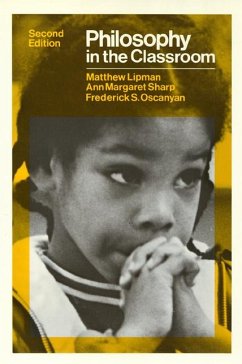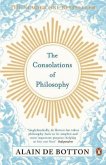Matthew Lipman
Philosophy in the Classroom
Matthew Lipman
Philosophy in the Classroom
- Broschiertes Buch
- Merkliste
- Auf die Merkliste
- Bewerten Bewerten
- Teilen
- Produkt teilen
- Produkterinnerung
- Produkterinnerung
A textbook for teachers that demonstrates how philosophical thinking can be used in teaching children
Andere Kunden interessierten sich auch für
![The Political Classroom The Political Classroom]() Diana E. Hess (University of Wisconsin-Madison, WI, USA)The Political Classroom56,99 €
Diana E. Hess (University of Wisconsin-Madison, WI, USA)The Political Classroom56,99 €![The Aesthetics of Environment The Aesthetics of Environment]() Arnold BerleantThe Aesthetics of Environment44,99 €
Arnold BerleantThe Aesthetics of Environment44,99 €![The Meaning of Life The Meaning of Life]() Terry Eagleton (John Edward Taylor Professor of English at the UnivThe Meaning of Life12,99 €
Terry Eagleton (John Edward Taylor Professor of English at the UnivThe Meaning of Life12,99 €![To Explain the World To Explain the World]() Steven WeinbergTo Explain the World10,99 €
Steven WeinbergTo Explain the World10,99 €![The Consolations of Philosophy The Consolations of Philosophy]() Alain de BottonThe Consolations of Philosophy13,99 €
Alain de BottonThe Consolations of Philosophy13,99 €![The Invention of Africa The Invention of Africa]() V. Y. MudimbeThe Invention of Africa27,99 €
V. Y. MudimbeThe Invention of Africa27,99 €![The Greatest Minds and Ideas of All Time The Greatest Minds and Ideas of All Time]() Will DurantThe Greatest Minds and Ideas of All Time24,99 €
Will DurantThe Greatest Minds and Ideas of All Time24,99 €-
-
-
A textbook for teachers that demonstrates how philosophical thinking can be used in teaching children
Hinweis: Dieser Artikel kann nur an eine deutsche Lieferadresse ausgeliefert werden.
Hinweis: Dieser Artikel kann nur an eine deutsche Lieferadresse ausgeliefert werden.
Produktdetails
- Produktdetails
- Verlag: Temple University Press, U.S.
- Seitenzahl: 248
- Erscheinungstermin: 15. Mai 1980
- Englisch
- Abmessung: 227mm x 151mm x 19mm
- Gewicht: 390g
- ISBN-13: 9780877221838
- ISBN-10: 0877221839
- Artikelnr.: 21495150
- Herstellerkennzeichnung
- Libri GmbH
- Europaallee 1
- 36244 Bad Hersfeld
- 06621 890
- Verlag: Temple University Press, U.S.
- Seitenzahl: 248
- Erscheinungstermin: 15. Mai 1980
- Englisch
- Abmessung: 227mm x 151mm x 19mm
- Gewicht: 390g
- ISBN-13: 9780877221838
- ISBN-10: 0877221839
- Artikelnr.: 21495150
- Herstellerkennzeichnung
- Libri GmbH
- Europaallee 1
- 36244 Bad Hersfeld
- 06621 890
Matthew Lipman is Director of the Institute for the Advancement of Philosophy for Children. Ann Margaret Sharp, Assistant Director of the Institute, is also co-editor with Matthew Lipman of Growing Up with Philosophy. Frederick S. Oscanyan is a lecturer in the Department of Philosophy at Yale University.
Preface Part I: Encouraging Children to Be Thoughtful 1. The Need for Educational Redesign Educational Dysfunction
Failure of Remedial Approaches
Meeting Expectations
Discovery
Frustration
Meaningful Experiences
Need for Adventure
Meaning versus Rationality 2. Thinking and the School Curriculum The Child's Hunger for Meaning
Thinking Skillfully
Thinking Skills and Basic Skills
Thinking Skills and Other Academic Disciplines
The Relationship between Dialogue and Thinking
Thinking Well about Things That Matter 3. Philosophy: The Lost Dimension in Education Philosophy Begins in Wonder
Wonder and Meaning
Scientific Explanation
Symbolic Interpretation
Philosophical Investigation 4. Some Educational Presuppositions of Philosophy for Children Preserving the Integrity of Philosophy as a Discipline
Converting the Classroom into a Community of Inquiry
Preparing the Teacher and the Curriculum Part II: Aims and Methods of Philosophy for Children 5. The Philosophy for Children Curriculum Description of Curriculum
Aims and Objectives of Philosophy for Children
Improvement of Reasoning Ability
Development of Creativity
Personal and Interpersonal Growth
Development of Ethical Understanding
Development of the Ability to Find Meaning in Experience 6. Teaching Methodology: Value Considerations and Standards of Practice Getting Children to Think for Themselves
Conditions for Teaching Philosophical Thinking
Teaching Behavior Conductive to Helping Children Engage in Philosophical Thinking 7. Guiding a Philosophical Discussion Philosophy and the Strategies of Dialogue
Guiding a Classroom Discussion
The Role of Ideas in a Philosophical Dialogue
Fostering Philosophical Dialogue
Eliciting Views or Opinions
Helping Students Express Themselves: Clarification and Restatement
Explicating Students' Views
Interpretation
Seeking Consistency
Requesting Definitions
Searching for Assumptions
Indicating Fallacies
Requesting Reasons
Asking Students to Say How They Know
Eliciting and Examining Alternatives
Orchestrating a Discussion Part III: Applying Thinking Skills to School Experience 8. Encouraging Children to Be Logical Formal Logic as an Aid to Philosophical Thinking
Giving Reasons: The Good Reasons Approach
Acting Rationally
Conclusion 9. Can Moral Education Be Divorced from Philosophical Inquiry The Presumption of Rationality
Setting the Stage for Moral Growth
Socialization and Autonomy in Moral Education
Dangerous Dichotomies in Moral Education
What to Do to Help the Children Know What to Do
Imagination and Moral Education
Where to Begin
Why Moral Education Cannot Be Divorced form Philosophical Education
The Relationship between Logic and Morality
The Improvement of Moral Judgment 10. Philosophical Themes in Ethical Inquiry for Children The Relation of Logic to Ethics
Consistency
The Right and the Fair
Perfect and Right
Free Will and Determination
Natural
Change and Growth
Truth
Caring
Standards and Rules
Questions and Answers
Thinking and Thinking for Oneself in Ethical Inquiry Appendix A: The Reform of Teacher Education Appendix B: Experimental Research in Philosophy for Children Bibliography
Failure of Remedial Approaches
Meeting Expectations
Discovery
Frustration
Meaningful Experiences
Need for Adventure
Meaning versus Rationality 2. Thinking and the School Curriculum The Child's Hunger for Meaning
Thinking Skillfully
Thinking Skills and Basic Skills
Thinking Skills and Other Academic Disciplines
The Relationship between Dialogue and Thinking
Thinking Well about Things That Matter 3. Philosophy: The Lost Dimension in Education Philosophy Begins in Wonder
Wonder and Meaning
Scientific Explanation
Symbolic Interpretation
Philosophical Investigation 4. Some Educational Presuppositions of Philosophy for Children Preserving the Integrity of Philosophy as a Discipline
Converting the Classroom into a Community of Inquiry
Preparing the Teacher and the Curriculum Part II: Aims and Methods of Philosophy for Children 5. The Philosophy for Children Curriculum Description of Curriculum
Aims and Objectives of Philosophy for Children
Improvement of Reasoning Ability
Development of Creativity
Personal and Interpersonal Growth
Development of Ethical Understanding
Development of the Ability to Find Meaning in Experience 6. Teaching Methodology: Value Considerations and Standards of Practice Getting Children to Think for Themselves
Conditions for Teaching Philosophical Thinking
Teaching Behavior Conductive to Helping Children Engage in Philosophical Thinking 7. Guiding a Philosophical Discussion Philosophy and the Strategies of Dialogue
Guiding a Classroom Discussion
The Role of Ideas in a Philosophical Dialogue
Fostering Philosophical Dialogue
Eliciting Views or Opinions
Helping Students Express Themselves: Clarification and Restatement
Explicating Students' Views
Interpretation
Seeking Consistency
Requesting Definitions
Searching for Assumptions
Indicating Fallacies
Requesting Reasons
Asking Students to Say How They Know
Eliciting and Examining Alternatives
Orchestrating a Discussion Part III: Applying Thinking Skills to School Experience 8. Encouraging Children to Be Logical Formal Logic as an Aid to Philosophical Thinking
Giving Reasons: The Good Reasons Approach
Acting Rationally
Conclusion 9. Can Moral Education Be Divorced from Philosophical Inquiry The Presumption of Rationality
Setting the Stage for Moral Growth
Socialization and Autonomy in Moral Education
Dangerous Dichotomies in Moral Education
What to Do to Help the Children Know What to Do
Imagination and Moral Education
Where to Begin
Why Moral Education Cannot Be Divorced form Philosophical Education
The Relationship between Logic and Morality
The Improvement of Moral Judgment 10. Philosophical Themes in Ethical Inquiry for Children The Relation of Logic to Ethics
Consistency
The Right and the Fair
Perfect and Right
Free Will and Determination
Natural
Change and Growth
Truth
Caring
Standards and Rules
Questions and Answers
Thinking and Thinking for Oneself in Ethical Inquiry Appendix A: The Reform of Teacher Education Appendix B: Experimental Research in Philosophy for Children Bibliography
Preface Part I: Encouraging Children to Be Thoughtful 1. The Need for Educational Redesign Educational Dysfunction
Failure of Remedial Approaches
Meeting Expectations
Discovery
Frustration
Meaningful Experiences
Need for Adventure
Meaning versus Rationality 2. Thinking and the School Curriculum The Child's Hunger for Meaning
Thinking Skillfully
Thinking Skills and Basic Skills
Thinking Skills and Other Academic Disciplines
The Relationship between Dialogue and Thinking
Thinking Well about Things That Matter 3. Philosophy: The Lost Dimension in Education Philosophy Begins in Wonder
Wonder and Meaning
Scientific Explanation
Symbolic Interpretation
Philosophical Investigation 4. Some Educational Presuppositions of Philosophy for Children Preserving the Integrity of Philosophy as a Discipline
Converting the Classroom into a Community of Inquiry
Preparing the Teacher and the Curriculum Part II: Aims and Methods of Philosophy for Children 5. The Philosophy for Children Curriculum Description of Curriculum
Aims and Objectives of Philosophy for Children
Improvement of Reasoning Ability
Development of Creativity
Personal and Interpersonal Growth
Development of Ethical Understanding
Development of the Ability to Find Meaning in Experience 6. Teaching Methodology: Value Considerations and Standards of Practice Getting Children to Think for Themselves
Conditions for Teaching Philosophical Thinking
Teaching Behavior Conductive to Helping Children Engage in Philosophical Thinking 7. Guiding a Philosophical Discussion Philosophy and the Strategies of Dialogue
Guiding a Classroom Discussion
The Role of Ideas in a Philosophical Dialogue
Fostering Philosophical Dialogue
Eliciting Views or Opinions
Helping Students Express Themselves: Clarification and Restatement
Explicating Students' Views
Interpretation
Seeking Consistency
Requesting Definitions
Searching for Assumptions
Indicating Fallacies
Requesting Reasons
Asking Students to Say How They Know
Eliciting and Examining Alternatives
Orchestrating a Discussion Part III: Applying Thinking Skills to School Experience 8. Encouraging Children to Be Logical Formal Logic as an Aid to Philosophical Thinking
Giving Reasons: The Good Reasons Approach
Acting Rationally
Conclusion 9. Can Moral Education Be Divorced from Philosophical Inquiry The Presumption of Rationality
Setting the Stage for Moral Growth
Socialization and Autonomy in Moral Education
Dangerous Dichotomies in Moral Education
What to Do to Help the Children Know What to Do
Imagination and Moral Education
Where to Begin
Why Moral Education Cannot Be Divorced form Philosophical Education
The Relationship between Logic and Morality
The Improvement of Moral Judgment 10. Philosophical Themes in Ethical Inquiry for Children The Relation of Logic to Ethics
Consistency
The Right and the Fair
Perfect and Right
Free Will and Determination
Natural
Change and Growth
Truth
Caring
Standards and Rules
Questions and Answers
Thinking and Thinking for Oneself in Ethical Inquiry Appendix A: The Reform of Teacher Education Appendix B: Experimental Research in Philosophy for Children Bibliography
Failure of Remedial Approaches
Meeting Expectations
Discovery
Frustration
Meaningful Experiences
Need for Adventure
Meaning versus Rationality 2. Thinking and the School Curriculum The Child's Hunger for Meaning
Thinking Skillfully
Thinking Skills and Basic Skills
Thinking Skills and Other Academic Disciplines
The Relationship between Dialogue and Thinking
Thinking Well about Things That Matter 3. Philosophy: The Lost Dimension in Education Philosophy Begins in Wonder
Wonder and Meaning
Scientific Explanation
Symbolic Interpretation
Philosophical Investigation 4. Some Educational Presuppositions of Philosophy for Children Preserving the Integrity of Philosophy as a Discipline
Converting the Classroom into a Community of Inquiry
Preparing the Teacher and the Curriculum Part II: Aims and Methods of Philosophy for Children 5. The Philosophy for Children Curriculum Description of Curriculum
Aims and Objectives of Philosophy for Children
Improvement of Reasoning Ability
Development of Creativity
Personal and Interpersonal Growth
Development of Ethical Understanding
Development of the Ability to Find Meaning in Experience 6. Teaching Methodology: Value Considerations and Standards of Practice Getting Children to Think for Themselves
Conditions for Teaching Philosophical Thinking
Teaching Behavior Conductive to Helping Children Engage in Philosophical Thinking 7. Guiding a Philosophical Discussion Philosophy and the Strategies of Dialogue
Guiding a Classroom Discussion
The Role of Ideas in a Philosophical Dialogue
Fostering Philosophical Dialogue
Eliciting Views or Opinions
Helping Students Express Themselves: Clarification and Restatement
Explicating Students' Views
Interpretation
Seeking Consistency
Requesting Definitions
Searching for Assumptions
Indicating Fallacies
Requesting Reasons
Asking Students to Say How They Know
Eliciting and Examining Alternatives
Orchestrating a Discussion Part III: Applying Thinking Skills to School Experience 8. Encouraging Children to Be Logical Formal Logic as an Aid to Philosophical Thinking
Giving Reasons: The Good Reasons Approach
Acting Rationally
Conclusion 9. Can Moral Education Be Divorced from Philosophical Inquiry The Presumption of Rationality
Setting the Stage for Moral Growth
Socialization and Autonomy in Moral Education
Dangerous Dichotomies in Moral Education
What to Do to Help the Children Know What to Do
Imagination and Moral Education
Where to Begin
Why Moral Education Cannot Be Divorced form Philosophical Education
The Relationship between Logic and Morality
The Improvement of Moral Judgment 10. Philosophical Themes in Ethical Inquiry for Children The Relation of Logic to Ethics
Consistency
The Right and the Fair
Perfect and Right
Free Will and Determination
Natural
Change and Growth
Truth
Caring
Standards and Rules
Questions and Answers
Thinking and Thinking for Oneself in Ethical Inquiry Appendix A: The Reform of Teacher Education Appendix B: Experimental Research in Philosophy for Children Bibliography








